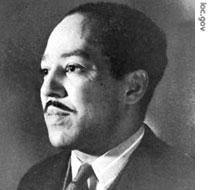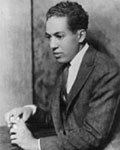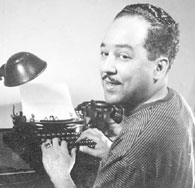VOA慢速英语 2008 0406
搜索关注在线英语听力室公众号:tingroom,领取免费英语资料大礼包。
(单词翻译)
VOICE ONE:I’m Mary Tillotson.
VOICE TWO:
And I’m Steve Ember with the VOA Special English program, PEOPLE IN AMERICA. Today, we tell about writer Langston Hughes, who has been called the poet voice of African-Americans.
(MUSIC)
VOICE ONE:
 |
| Langston Hughes |
Langston Hughes is usually thought of as a poet. But he also wrote novels, plays, short stories, essays, autobiographies1, newspaper columns, children’s books, and the words to operas. He also translated into English the works of foreign poets.
Hughes was one of the first black writers who could support himself by his writings. He is praised for his ability to say what was important to millions of black people.
Hughes produced a huge amount of work during his lifetime. He also has influenced the work of many other writers. He wrote for almost fifty years.
VOICE TWO:
Langston Hughes was famous for his descriptions of black American life. He used his work to praise his people and voice his concerns about race and social injustice2. His work is known all around the world and has been translated into many languages.
Hughes’s poetry had serious messages. He often wrote about racial issues, describing his people in a realistic way. Although his story was not often pleasant, he told it with understanding and with hope.
(MUSIC)
VOICE ONE:
Langston Hughes was born in Joplin, Missouri, in nineteen-oh-two. His parents were separated. He spent most of his childhood with his grandmother in Lawrence, Kansas. She told him stories about their family and their fight to end slavery. Her storytelling filled him with pride in himself and his race. He first began to write poetry when he was living with her.
When he was fourteen, he moved to Cleveland, Ohio, to stay with his mother and her new husband.
He attended Central High School in Cleveland, Ohio. Langston was named Class Poet one year. He published his first short stories while he was still in high school.
VOICE TWO:
Langston Hughes struggled with a feeling of loneliness caused by his parent’s divorce. He developed a love of reading books as a way to deal with the lack of time his parents spent with him. His love for reading grew into a desire to write. He wanted to reproduce3 the powerful effect other writers had made upon him. Among the early influences on his writing were poets Walt Whitman, Carl Sandburg and Paul Lawrence Dunbar.
After graduating from high school in nineteen twenty, Langston moved to Mexico City to live with his father for one year. His father had moved there to escape racism4 in America. His father did not offer much warmth to his son. Yet, Langston turned the pain caused by his family problems into one of his most famous poems, “The Negro Speaks of Rivers.” In this poem, he speaks of the strength and pride of black people in ancient African civilizations and in America.
(SOUND: “The Negro Speaks of Rivers”)
VOICE ONE:
Langston Hughes learned a lot about race, and about social and economic conditions while he was in Mexico. His ability to speak Spanish and his brown skin often made it easy for him to appear to be a native. Many of his works, including a play for children, deal with his days in Mexico.
During the time he stayed with his father in Mexico, Langston wrote many poems because he was always unhappy. He once said that he usually created his best work when he was really not happy.
Langston had a troubled relationship with his father from which he never recovered fully5. His father did not think he could earn a living as a writer. His mother, however, recognized his need to be a poet.
VOICE TWO:  Langston’s father agreed to pay for his college education at Columbia University in New York City, if he studied engineering. Langston arrived in New York when he was nineteen years old. At the end of that first year at Columbia, he left school, broke with his father, and began traveling. Traveling was a lifelong love that would take him throughout the world before he died.
Langston’s father agreed to pay for his college education at Columbia University in New York City, if he studied engineering. Langston arrived in New York when he was nineteen years old. At the end of that first year at Columbia, he left school, broke with his father, and began traveling. Traveling was a lifelong love that would take him throughout the world before he died.
In nineteen twenty-two, Hughes took a job on a ship and sailed to Africa. He would later sail to France, Russia, Spain and Italy. He wrote poems and short stories during his travels. His experiences while traveling greatly influenced his work. He sent a few of his writings back home. They were published, which helped establish him as a professional writer.
Financial problems ended Hughes’s travels. He tried to find work on a ship so he could return to the United States. But in Italy, he had problems finding work on a ship because he was black. In the poem, “I, Too”, he noted6 that the American color line even reached all the way over there.
(SOUND: “I, Too”)
VOICE ONE:
In nineteen twenty-four, Langston Hughes returned to the United States to live with his mother in Washington, D.C. The poet Vachel Lindsay ate in a hotel where Hughes was working. Hughes put some poems he had written next to Lindsay’s dinner plate. Lindsay gave a poetry reading later that night. He read some of Hughes’s poetry, too. Newspapers across the country wrote about Lindsay’s poetry reading. Hughes became known as a new black poet.
A year later, Hughes returned to New York. Through the years he lived in many places, but always came back to New York’s Harlem area. Harlem was the center of black life in New York City. Hughes’s creativity was influenced by his life in Harlem.
VOICE TWO:  Langston Hughes returned to New York during a period called the Harlem Renaissance7. It took place during the nineteen twenties and thirties. The Harlem Renaissance was a period of great artistic8 creativity among black people. For the first time, black artistic expression was being widely recognized. Hughes became friends with other great black writers of the time, such as Claude McKay, Countee Cullen and Zora Neal Hurston. They hoped that great art could change the racist9 ideas in America about African Americans.
Langston Hughes returned to New York during a period called the Harlem Renaissance7. It took place during the nineteen twenties and thirties. The Harlem Renaissance was a period of great artistic8 creativity among black people. For the first time, black artistic expression was being widely recognized. Hughes became friends with other great black writers of the time, such as Claude McKay, Countee Cullen and Zora Neal Hurston. They hoped that great art could change the racist9 ideas in America about African Americans.
Hughes was considered one of the leading voices of the Harlem Renaissance. He was the first poet to use the rhythms of black music. He often wrote about the everyday experiences of black working people. And he helped bring the movement of jazz and the sound of black speech into poetry.
VOICE ONE:
Langston Hughes experimented with his writing. Other Harlem Renaissance writers wrote traditional poems like those of English classic poets, such as William Shakespeare. Hughes broke free with his writing and helped change literature forever.
Hughes became firmly established as a successful writer in nineteen twenty-six with the publication of a collection of jazz poems called “The Weary10 Blues11.” Hughes wrote the poems in a place in Harlem where blues music was played. He loved to write while sitting in clubs listening to blues and jazz. The title poem, “The Weary Blues,” was written to be played with musical instruments. The poem perfectly12 expressed the desire of Langston Hughes to combine black music and speech in his poetry.
VOICE THREE:
“I got the Weary Blues and I can’t be satisfied. Got the Weary Blues and can’t be satisfied. I ain’t happy no mo’ and I wish that I had died.”
“And far into the night he crooned that tune13. The stars went out and so did the moon. The singer stopped playing and went to bed – while the Weary Blues echoed14 through his head. He slept like a rock or a man that’s dead.”
VOICE TWO:
Poems in “The Weary Blues” are warm and full of color. They have a sense of freedom, like that of jazz music. Langston Hughes was excited about the new form of poetry he had discovered for himself.
(MUSIC)
VOICE ONE:
This Special English program was written by Cynthia Kirk. It was produced by Caty Weaver15. The poetry was read by Langston Hughes and Shep O’Neal. I’m Mary Tillotson.
VOICE TWO:
And I’m Steve Ember. Join us again next week for another PEOPLE IN AMERICA program on VOA when we finish the story of the life of Langston Hughes.
 收听单词发音
收听单词发音 




